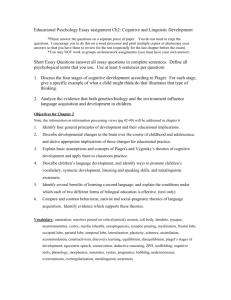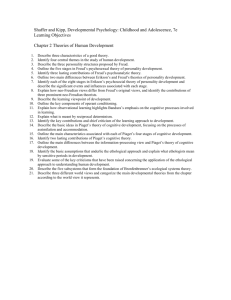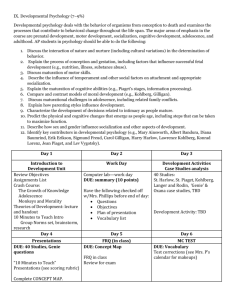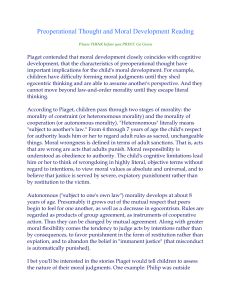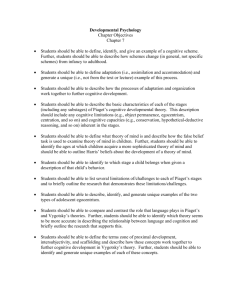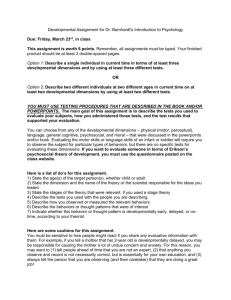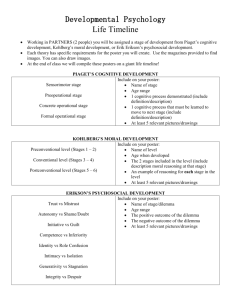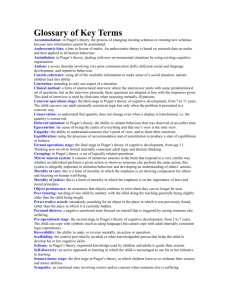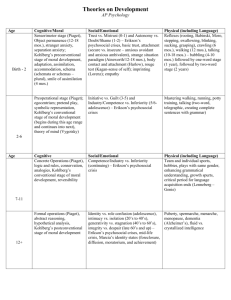CHAPTER 2 CHAPTER SUMMARY WHAT ARE SOME VIEWS OF
advertisement
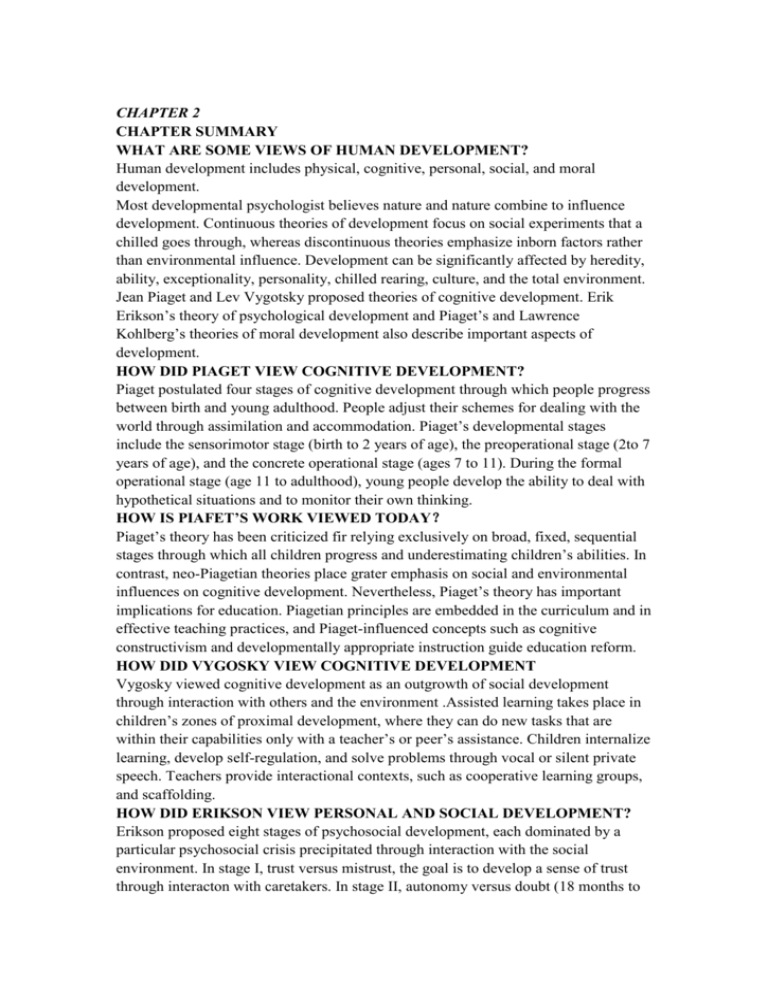
CHAPTER 2 CHAPTER SUMMARY WHAT ARE SOME VIEWS OF HUMAN DEVELOPMENT? Human development includes physical, cognitive, personal, social, and moral development. Most developmental psychologist believes nature and nature combine to influence development. Continuous theories of development focus on social experiments that a chilled goes through, whereas discontinuous theories emphasize inborn factors rather than environmental influence. Development can be significantly affected by heredity, ability, exceptionality, personality, chilled rearing, culture, and the total environment. Jean Piaget and Lev Vygotsky proposed theories of cognitive development. Erik Erikson’s theory of psychological development and Piaget’s and Lawrence Kohlberg’s theories of moral development also describe important aspects of development. HOW DID PIAGET VIEW COGNITIVE DEVELOPMENT? Piaget postulated four stages of cognitive development through which people progress between birth and young adulthood. People adjust their schemes for dealing with the world through assimilation and accommodation. Piaget’s developmental stages include the sensorimotor stage (birth to 2 years of age), the preoperational stage (2to 7 years of age), and the concrete operational stage (ages 7 to 11). During the formal operational stage (age 11 to adulthood), young people develop the ability to deal with hypothetical situations and to monitor their own thinking. HOW IS PIAFET’S WORK VIEWED TODAY? Piaget’s theory has been criticized fir relying exclusively on broad, fixed, sequential stages through which all children progress and underestimating children’s abilities. In contrast, neo-Piagetian theories place grater emphasis on social and environmental influences on cognitive development. Nevertheless, Piaget’s theory has important implications for education. Piagetian principles are embedded in the curriculum and in effective teaching practices, and Piaget-influenced concepts such as cognitive constructivism and developmentally appropriate instruction guide education reform. HOW DID VYGOSKY VIEW COGNITIVE DEVELOPMENT Vygosky viewed cognitive development as an outgrowth of social development through interaction with others and the environment .Assisted learning takes place in children’s zones of proximal development, where they can do new tasks that are within their capabilities only with a teacher’s or peer’s assistance. Children internalize learning, develop self-regulation, and solve problems through vocal or silent private speech. Teachers provide interactional contexts, such as cooperative learning groups, and scaffolding. HOW DID ERIKSON VIEW PERSONAL AND SOCIAL DEVELOPMENT? Erikson proposed eight stages of psychosocial development, each dominated by a particular psychosocial crisis precipitated through interaction with the social environment. In stage I, trust versus mistrust, the goal is to develop a sense of trust through interacton with caretakers. In stage II, autonomy versus doubt (18 months to age 3 ), children have a dual desire to hold on and to let go. In stage III initiative versus guilt (3 to 6 years of age ), children elaborate their sense of self through exploration of environment. Children enter school during Stage IV, industry versus inferiority (6 to 12 years of age),when academic success or failure is central. In Stage V, identity versus role confusion (12 to 18 years), adolescents turn from family to peer group and begin their searches for partners and careers. Adulthood brings Stage VI (intimacy versus isolation),Stage VII(generativity versus self-absorption ), and Stage VIII (integrity versus despair). WHAT ARE SOME THEORIES OF MORAL DEVELOPMENT? According to Piaget, children develop heteronomous morality (obedience to authority through moral realism ) by around age 6 and later advance to autonomous morality (rational morality based on moral principles ). Kohlberg’s 5 stages of moral reasoning reflect childen’s responses to moral dilemmas. In Stage 1 and 2 (the preconventional level) children obey rules set down by others while maximizing self-interest. In Stage 3 and 4 (the conventional level) the individual adopts rules, believes in law and orders, and seeks the approval of others. In Stage 5 and 6 (the postconventional level), people define their own values in terms of abstract ethical principles they have chosen to follow. Critics point out that Kohlberg’s study was based only on male subjects. Studies suggest that their may be little connection between what children say and their actual moral behavior. *KEY TERMS *accommodation 31 *adaptation 31 assimilation 31 autonomous morality 54 centration 33 class inclusion 37 cognitive development 30 concrete operational stage 36 conservation 33 constructivism 33 continuous theory of development 29 conventional level of morality 56 development 28 developmentally appropriate education 41 discontinuous theories of development 29 egocentric 36 equilibration 31 formal operational stage 39 heteronomous morality 54 inferred reality 37 moral dilemmans 54 objects permanence 33 postconventional level of morality 56 perconventional stage 33 private speech 44 psychosocial crisis 49 psychosocial theory 49 reflexes 33 reversibility 33 scaffolding 44 schemes 30 self-regulation 44 sensor motor stage 33 seriation 37 sign systems 43 transitivity 37 zone of proximal development 44

